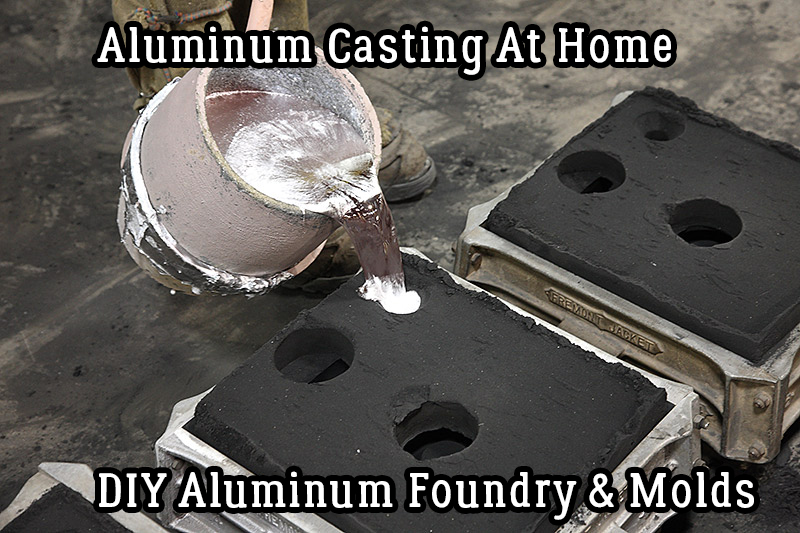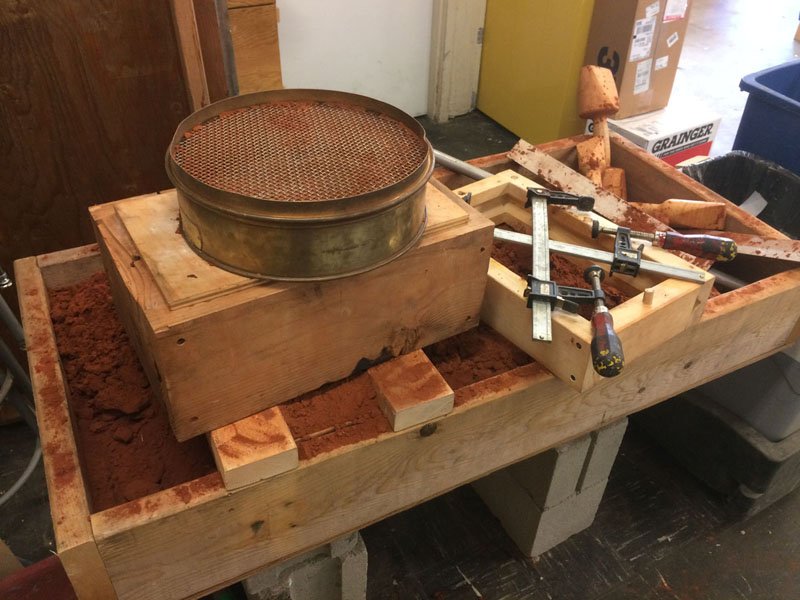Aluminum Foundry Wisconsin supports industries with casting solutions
Comprehending the Conveniences and Innovations in the Aluminum Foundry Industry
The Aluminum Foundry industry plays a necessary duty in modern manufacturing. Its lightweight buildings especially enhance fuel efficiency, particularly in aerospace and vehicle markets. In enhancement, Aluminum's resistance to deterioration guarantees longevity in various applications. As the industry develops, developments such as sophisticated recycling and additive manufacturing are reshaping manufacturing approaches. Discovering these innovations reveals not only the benefits yet also the difficulties in advance for Aluminum shops in a rapidly changing market.
The Lightweight Benefit of Aluminum
Aluminum's lightweight nature supplies considerable advantages across different markets, specifically in production and transport. Its reduced thickness permits the production of elements that are less complicated to mount and take care of, leading to lowered labor prices and enhanced efficiency. In the auto field, lighter automobiles add to boosted fuel economy and lower emissions, straightening with worldwide sustainability goals. Similarly, in aerospace, the usage of Aluminum minimizes the general weight of aircraft, which is crucial for enhancing efficiency and decreasing operational prices.
Additionally, Aluminum's lightweight buildings assist in innovative styles that were formerly unfeasible with heavier materials. This versatility enables makers to create intricate shapes and frameworks while maintaining structural stability. On the whole, the lightweight benefit of Aluminum not only boosts product performance however also drives advancements in innovation and style, making it a recommended product in numerous applications.
Corrosion Resistance and Longevity
The Aluminum Foundry sector is renowned for producing materials with remarkable deterioration resistance, making them suitable for various applications. This property, combined with improved architectural honesty, contributes to the lasting performance advantages that Aluminum parts supply. Therefore, markets increasingly rely upon Aluminum to satisfy requiring ecological conditions without compromising top quality.
Superior Rust Resistance
While numerous steels encounter significant difficulties from ecological aspects, Aluminum attracts attention for its remarkable rust resistance, making it a favored option in lots of applications. This building is primarily due to an all-natural oxide layer that forms on the Aluminum surface area, providing a barrier against dampness and harsh agents. Unlike other metals that may rust or degrade over time, Aluminum maintains its integrity also in rough atmospheres, such as industrial settings or seaside locations. In addition, its lightweight nature combined with deterioration resistance makes it perfect for applications in aerospace, automobile, and aquatic markets. On the whole, Aluminum's outstanding durability not only boosts product durability yet also lowers upkeep prices, providing an engaging advantage for consumers and manufacturers alike.
Boosted Structural Honesty
Designers and developers progressively recognize the value of boosted structural integrity in modern-day applications, where both rust resistance and toughness are vital. Aluminum alloys, understood for their light-weight residential or commercial properties, additionally display outstanding resistance to corrosion, making them suitable for rough atmospheres. The cutting-edge strategies employed in the Aluminum Foundry market add considerably to generating components with enhanced durability. Advanced casting processes and alloy structures are customized to meet certain efficiency requirements, ensuring that structures can hold up against extreme conditions without compromising honesty. Furthermore, surface area therapies and coatings improve the lifespan of Aluminum products, even more alleviating deterioration gradually. This concentrate on enhanced structural stability not just expands the usability of materials however additionally lowers upkeep prices, solidifying Aluminum's position as a product of selection in numerous industries.
Lasting Performance Benefits
Long-lasting performance in Aluminum components is largely attributed to their remarkable rust resistance and durability. Unlike numerous metals, Aluminum naturally forms a safety oxide layer, which prevents corrosion and deterioration in numerous settings, including aquatic and commercial setups. This inherent residential property significantly prolongs the lifespan of Aluminum items, lessening maintenance and substitute prices. Additionally, the lightweight nature of Aluminum improves its applicability across sectors without jeopardizing strength. The product's resistance to deterioration also adds to its dependability in demanding applications, making it a perfect selection for vehicle, aerospace, and building sectors. As sectors progressively focus on sustainability and durability, Aluminum's efficiency benefits align with modern-day engineering demands, solidifying its duty in ingenious production procedures.
Ecological Impact and Sustainability
 As the Aluminum Foundry sector evolves, it progressively prioritizes environmental effect and sustainability, identifying the requirement for accountable techniques in the face of climate modification. Initiatives to decrease waste and energy consumption are at the center, with many factories adopting recycling initiatives to recover Aluminum scrap. This not just decreases resources use however additionally significantly reduces energy expenditure, as recycled Aluminum needs only a fraction of the power contrasted to primary manufacturing.
As the Aluminum Foundry sector evolves, it progressively prioritizes environmental effect and sustainability, identifying the requirement for accountable techniques in the face of climate modification. Initiatives to decrease waste and energy consumption are at the center, with many factories adopting recycling initiatives to recover Aluminum scrap. This not just decreases resources use however additionally significantly reduces energy expenditure, as recycled Aluminum needs only a fraction of the power contrasted to primary manufacturing.Developments in discharges manage modern technologies are being applied to lower air pollutants, aligning operations with stricter environmental guidelines. Shops are also exploring alternative energy resources, such as solar and wind, to power their centers sustainably. By promoting partnership with stakeholders, the market intends to develop ingenious services that improve eco-friendly stewardship. find more Collectively, these campaigns highlight a dedication to minimizing the Aluminum Foundry's carbon impact while advertising a circular economy within the manufacturing field.
Advanced Manufacturing Techniques
 Revolutionizing manufacturing processes, the Aluminum Foundry industry is significantly incorporating advanced production methods to improve performance and precision. Strategies such as computer mathematical control (CNC) machining and additive manufacturing have actually become necessary components in maximizing production process. CNC machining allows for high-precision element construction, substantially lowering product waste and production time. At the same time, additive manufacturing opens up new methods for complex geometries and lightweight layouts that were previously challenging to attain.
Revolutionizing manufacturing processes, the Aluminum Foundry industry is significantly incorporating advanced production methods to improve performance and precision. Strategies such as computer mathematical control (CNC) machining and additive manufacturing have actually become necessary components in maximizing production process. CNC machining allows for high-precision element construction, substantially lowering product waste and production time. At the same time, additive manufacturing opens up new methods for complex geometries and lightweight layouts that were previously challenging to attain.Additionally, the release of automation and robotics in Aluminum foundries enhances procedures, minimizes human error, and boosts worker security. These modern technologies help with an even more receptive manufacturing environment, allowing suppliers to adapt swiftly to market demands. The combination of advanced simulation software application even more boosts the layout and testing stages, resulting in premium item quality. Jointly, these techniques not just improve functional effectiveness however additionally foster advancement, positioning the Aluminum Foundry sector at the forefront of modern-day manufacturing.
Developments in Recycling Processes
The Aluminum Foundry industry is not just progressing in making strategies however is likewise making significant strides in recycling processes. Advancements are emerging to boost the effectiveness of reusing techniques, minimizing power consumption and enhancing sustainability. Advanced sorting technologies, such as automated optical sorting, make it navigate to these guys possible for the recognition and separation of Aluminum from various other materials with high precision. This brings about a better of recycled Aluminum, which is essential for keeping the stability of the final items.
Additionally, closed-loop recycling systems are being executed, enabling manufacturers to recycle Aluminum scrap within their own production procedures. This minimizes waste and advertises a circular economic situation. Furthermore, research right into new recycling strategies, such as hydrometallurgical processes, offers the possibility for recuperating Aluminum from complex waste streams. These innovations not only add to minimizing the carbon impact of the Aluminum Foundry industry however additionally reinforce its financial practicality in a significantly environmentally mindful market.
Applications Throughout Various Industries
Countless industries are progressively recognizing the flexibility and advantages of Aluminum Foundry items, resulting in extensive applications throughout sectors such as automobile, aerospace, building and construction, and consumer items. In the automobile sector, Aluminum castings add to lightweight lorry designs, improving gas efficiency and performance. Aerospace makers utilize Aluminum parts for their strength-to-weight ratio, necessary for aircraft frameworks and parts.
In building and construction, Aluminum is preferred for its durability and resistance to rust, making it optimal for home window frames, roof covering, and structural assistances. Consumer products additionally profit from Aluminum Foundry items, as seen in kitchenware, electronic devices, and product packaging, where lightweight and recyclable products are important.
The versatility of Aluminum Foundry methods permits specific requirements and detailed layouts, dealing with the varied demands of these industries. Because of this, Aluminum Foundry items are ending up being integral to modern production procedures across various sectors.
Future Trends in Aluminum Foundries
As sectors remain to develop, Aluminum factories are poised to welcome a number of essential fads that guarantee to enhance efficiency and sustainability. One noticeable trend is the increasing adoption of electronic innovations, consisting of automation and artificial knowledge, which improve procedures and enhance high quality control. On top of that, the press towards lasting methods is leading factories to purchase recycling technologies, greatly minimizing waste and energy intake.
 An additional emerging pattern is the usage of advanced alloys and products, dealing with the expanding need for lightweight and long lasting parts across different markets (Aluminum Foundry). The combination of additive manufacturing methods is prepared for to transform component layout, supplying customization and reducing lead times.
An additional emerging pattern is the usage of advanced alloys and products, dealing with the expanding need for lightweight and long lasting parts across different markets (Aluminum Foundry). The combination of additive manufacturing methods is prepared for to transform component layout, supplying customization and reducing lead times.Partnership with study establishments is also expected to drive development, as shops look for to create brand-new processes and materials. Aluminum Foundry. Jointly, these patterns suggest a transformative future for the Aluminum Foundry market, lining up with more comprehensive goals of sustainability and efficiency
Regularly Asked Questions
What Are the Typical Expenses Associated With Aluminum Foundry Manufacturing?
The regular prices connected with Aluminum Foundry production consist of resources, labor, energy, equipment maintenance, and overhead expenses. These factors collectively affect the total monetary investment required for efficient Aluminum casting procedures.
Exactly How Does Aluminum Compare to Other Metals in Strength?
Aluminum, while lighter than many steels, shows outstanding strength-to-weight ratios. Compared to steel, Aluminum is much less solid yet supplies excellent corrosion resistance, making it a beneficial choice in applications where weight and toughness are important.
What Precaution Remain In Place in Aluminum Foundries?
Precaution in Aluminum factories typically include necessary personal safety tools, ventilation systems to regulate fumes, routine equipment upkeep, training programs for employees, and adherence to rigorous security laws to lessen risks related to molten steel handling.
How Is Quality Assurance Managed in Aluminum Casting Processes?
Quality assurance in Aluminum casting procedures entails extensive evaluations at numerous stages, including raw visit our website material assessment, procedure tracking, and end product screening. Methods such as statistical process control and non-destructive screening assurance adherence to market standards.
What Qualifications Are Essential for Aluminum Foundry Suppliers?
The value of certifications for Aluminum Foundry providers includes ISO 9001 for top quality management, ISO 14001 for ecological monitoring, and industry-specific standards like ASTM and SAE, making certain compliance, security, and integrity in manufacturing processes.
The Aluminum Foundry market plays an important duty in modern manufacturing. The Aluminum Foundry market is renowned for generating materials with exceptional deterioration resistance, making them perfect for different applications. Revolutionizing manufacturing procedures, the Aluminum Foundry industry is progressively incorporating innovative manufacturing methods to enhance effectiveness and accuracy. The Aluminum Foundry market is not only progressing in making strategies but is also making considerable strides in recycling processes. As markets proceed to advance, Aluminum shops are positioned to embrace a number of essential patterns that guarantee to improve effectiveness and sustainability.